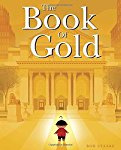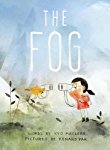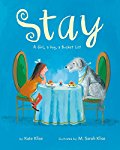On Friday I brought you a poetry book that celebrates books and the written word. Today we have a picture book that also focuses on how marvelous and special books are. Bob Staake tells the story of a boy who, when we first meet him, hates books. In fact, this boy does not like much of anything. He has no interest in the world, and no curiosity. Then someone tells him about a very special book, and something rather magical starts to happen.
 The Book of Gold
The Book of Gold
 The Book of Gold
The Book of Gold
Bob Staake
Picture Book
For ages 5 and up
Random House, 2017, 978-0-553-51077-5
Isaac’s parents love books. They love the way books smell
and how books feel when they are in their hands, and they love all the
fascinating information that books contained. Books are so full of
possibilities.
Unfortunately,
Isaac does not care for books at all. In fact, he is not much interested in
anything and it would not be unfair to say that he is a rather dull child.
One day Isaac’s
parents take him to visit the New York Public Library. The idea of going into a
building full of books thrills them, but Isaac does not feel the same way at
all. He has no interest in books and so it isn’t long before the family heads
for home. On the way they stop to look in a shop that contains all kinds of curios.
Isaac’s parents are hoping that they will find something that will make a
suitable birthday gift for Aunt Sadie. Isaac sits on the cold floor to wait.
Nothing in the fascinating store attracts his almost non-existent curiosity.
The shopkeeper
tries to find something that will interest Isaac and when she fails she tells
Isaac about a book called the Book of Gold. She explains that the book contains
“all the answers to every question ever asked, and when it is opened, it turns
to solid gold.”
The idea of
having a book made of gold really appeals to Isaac and he decides to look for
it. He goes to a bookstore. He picks up a book left in a diner. He picks up a
book that a woman drops, and finds another that is left on a trolley seat. None
of the books he finds turn to gold when it opens them.
For months Isaac
searches and searches. Then, one day, as he is looking at a book that is called
The Seven Wonders of the World, a
question pops into his head. It is the first of many questions that come to him
as he opens books looking for the Book of Gold. Without even meaning to Isaac
begins to discover that books bring forth questions, and they also answer them.
This marvelous
book shows readers that books are more than paper and board covers. They excite
our curiosity in the world, open up our horizons, and they can even lead us on
a voyage of discovery that can last a lifetime. This is a book that will
delight adults and children alike. It is a magical tale that is timeless and
ageless.








